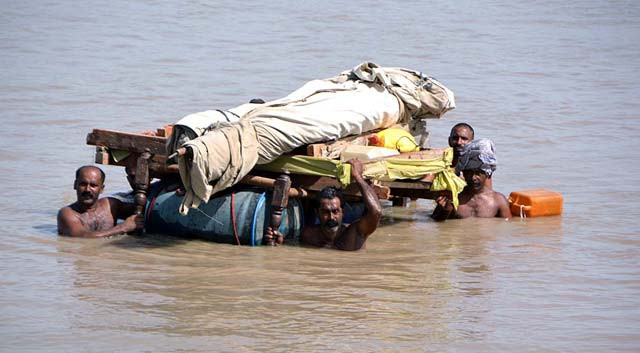12 years on: Govt far from improving disaster management
Audit report reveals severe shortcomings in NDMA’s relief operations

According to the National Disaster Management Authority some 920,000 people are displaced by the floods. PHOTO: APP
According to the latest performance audit report on relief activities carried out by the National Disaster Management Authority (NDMA) after the 2015 earthquake that claimed 227 lives, the body fell severely short of performing its duties.
The audit report that was compiled between August 2016 and September 2016 was based on reviewing files, records and documents as well as interviewing and carrying out a survey from management staff of NDMA and PDMA and the affected population.
Findings of the report were duly approved by Performance Audit Wing of Department of the Auditor General of Pakistan, holding NDMA responsible for huge number of causalities as rescue workers could not reach the disaster-hit areas in time.
The report stated that health facilities were not coordinated and medicines were not made available in crucial hours of emergency operations which were essential to save lives of victims.
It was revealed that even though NDMA immediately started relief and rescue operations after the earthquake, the performance was far from satisfactory.
PDMA reminds govt to come up with contingency plan
The apex disaster management authority did not prepare Standard Operating Procedures (SOPs) for emergency as well as a transition plan which resulted in ineffective relief operations.
Furthermore, medical, search and rescue teams were not timely mobilised in the affected areas as NDMA did not issue the necessary instructions to hospitals and rescue organisations.
It was also observed that mandatory stock levels of food, non-food and other relief items were not maintained by NDMA. Therefore as a result of non-maintenance of required reserves, procurement of necessary relief items was done by NDMA hastily and without observing Public Procurement Regulatory Authority (PPRA) Rules 2004.
The auditors further observed that NDMA did not coordinate or monitor the preparation of provincial and district plans for disaster management. It further pointed out that no tangible progress was made regarding capacity-building of local volunteers of disaster prone areas.
A year after the October 8, 2005 earthquake, the government promulgated the National Disaster Management Ordinance which was later enacted by the Parliament in 2010.
Responding to tragedy: Lives continue to be lost as aid trickles into Thar
Under the Act, the National Disaster Management Commission had been established under the chairmanship of Prime Minister as the highest policy making body in disaster management in the country.
Meanwhile as an implementing arm of the NDMC, the NDMA had been established to coordinate and monitor implementation of national policies and strategies on disaster management. PDMAs and NDMAs were also established at provincial and district levels respectively. But unfortunately, despite all these efforts, the apex disaster management authority failed to perform effectively even a decade after the 2005 earthquake.
Financial Management
The report reveals that after the 2015 earthquake, the prime minister announced relief compensation to the tune of Rs5.5billion for the victims.
Though the lump sum amount was released by the Ministry of Finance to the provincial government of Khyber-Pakhtunkhwa and accordingly it was distributed among the affected persons, the audit stated that incurrence of expenditure without ex-post facto ratification had rendered the entire expenditure of Rs5.5billion ‘irregular’.
The audit report further observed that due to weak management the department failed to obtain Disaster Risk Insurance.
Moreover, relief goods were also distributed without a predetermined criteria leading to favoritism.



















COMMENTS
Comments are moderated and generally will be posted if they are on-topic and not abusive.
For more information, please see our Comments FAQ